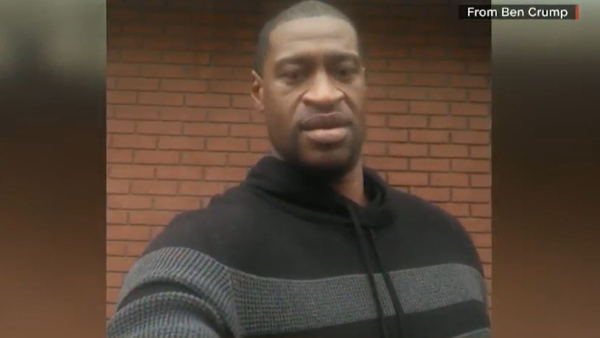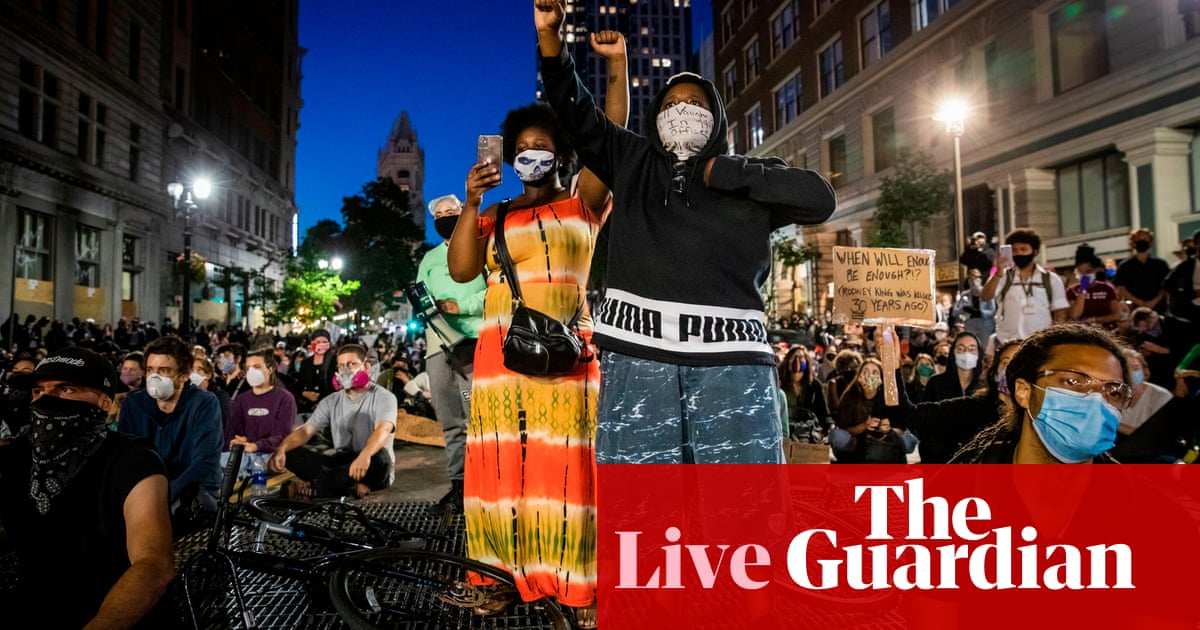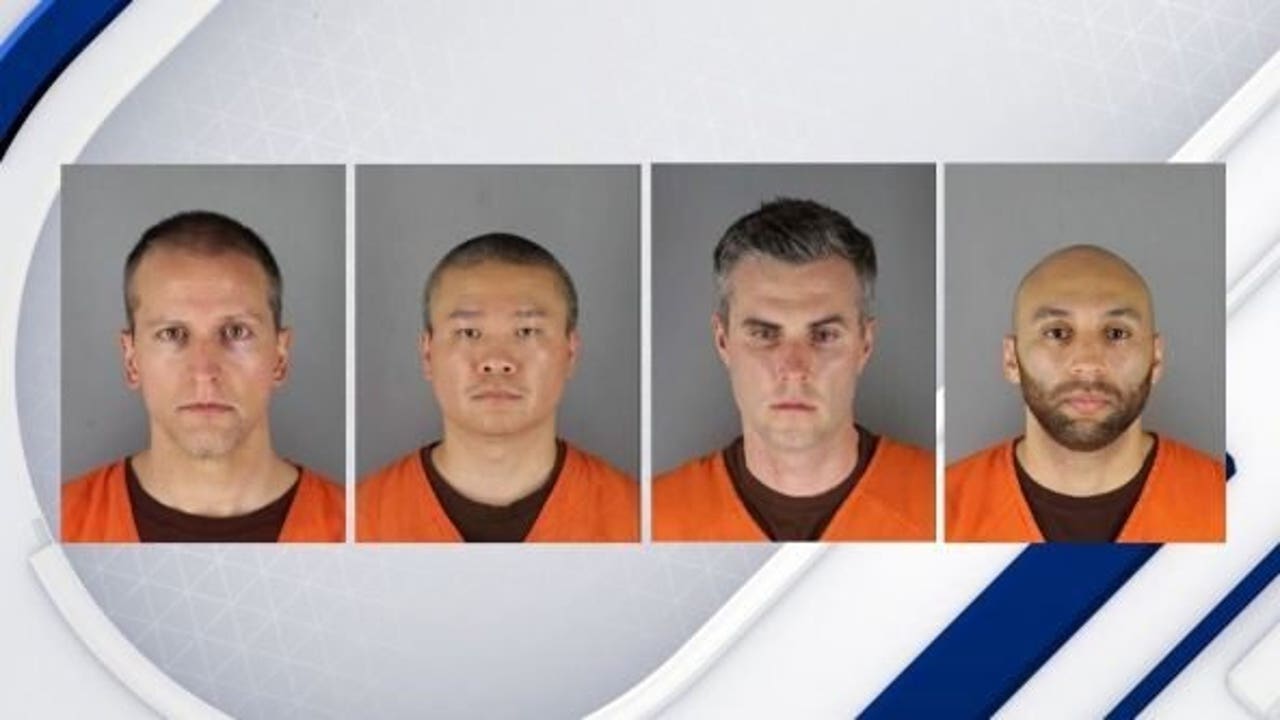What a just Justice Department would do about George Floyd’s death
Law enforcement officers wearing riot gear in Minneapolis on Sunday. (Joshua Lott/For The Washington Post)
By Vanita Gupta
June 2, 2020 at 7:30 a.m. EDT
Vanita Gupta, president and chief executive of the Leadership Conference on Civil and Human Rights, headed the Justice Department’s Civil Rights Division from 2014 to 2017.
The Justice Department has announced a criminal investigation into the killing of George Floyd, the unarmed black man who died after a police officer held his knee on Floyd’s throat for more than eight minutes. This is a first step, but there’s so much more that the Justice Department should be doing. However, given the Trump administration’s approach to police misconduct and civil rights since taking office, there is little hope that it will rise to this tragic occasion.
I know firsthand the challenges and responsibilities the Justice Department faces in situations such as this. My tenure as head of the
Civil Rights Division began just two months after 18-year-old Michael Brown was shot and killed by a police officer in Ferguson, Mo. Tensions were high in St. Louis and across the country. The Justice Department was not perfect, but we understood our mandate: to promote accountability and constitutional policing in order to build community trust.
Federal criminal prosecution here is exactly appropriate. The bar for federal prosecution is
extraordinarily high: Prosecutors must be able to prove that the force used was unreasonable and that the officer knew his or her actions were against the law and decided to do it anyway. In too many cases, the Justice Department has concluded evidence was insufficient to meet that high standard. But the facts of this case should suffice: Video recorded in broad daylight shows multiple officers on Floyd’s body. Floyd was in clear distress, repeating “I can’t breathe” as witnesses pleaded with officer Derek Chauvin to get off his neck over the course of eight minutes. And there was no physical threat: Floyd was handcuffed.
Full coverage of the George Floyd protests
While criminal accountability is essential, it alone is insufficient, because prosecuting an individual officer or officers will not address the underlying systemic issues plaguing the Minneapolis Police Department, even with a chief who has pushed some reforms. For a Justice Department committed to civil rights enforcement and constitutional policing, the next steps would be clear: First, officials, including the head of the Civil Rights Division, would be on the ground meeting with Floyd’s family, the police department, advocates and communities.
Second, such a department would also immediately open what’s called a “
pattern and practice” investigation to address systemic problems in the Minneapolis Police Department that cannot be confronted overnight or fixed with only criminal prosecution. This crisis goes far beyond the isolated acts of a few “bad apples.” Minneapolis and neighboring counties have a long history of discriminatory policing and black men dying at the hands of officers, including Jamar Clark and Philando Castile.
In such situations, pattern and practice investigations, authorized by a law passed in 1994 in the aftermath of the police beating of Rodney King in Los Angeles, expose systemic problems, not isolated incidents. After making findings, the Justice Department can negotiate consent decrees, overseen by an independent monitor and enforced by a federal court, to help transform a police department’s culture. While no police department is perfect, these consent decrees have resulted in dramatic changes in transforming police behavior and building trust between communities and police.
Third, the Justice Department would provide assistance to local law enforcement to help manage protests without militarization. It would work with police departments and local community leaders to find ways to de-escalate the situation. Later, it would complete an
after-action assessment in Minneapolis and elsewhere about the way the protests were handled to ensure departments learn from mistakes.
That is not the Justice Department we have. The Trump administration long ago ceded any moral authority and openly stirs racial hostility and division. Under attorneys general Jeff Sessions and William P. Barr, the department has effectively abandoned the use of pattern and practice investigations. Instead, it has focused on dismantling police reform efforts, gutting existing consent decrees and halting new investigations. Alarmingly, Barr
warned last year that if communities did not show deference to police, they “might find themselves without the police protection they need.”
There is no returning to normal — we have to create a new way forward. We’ve been through this too many times. In the absence of leadership from the administration, leadership elsewhere is critical. Governors, mayors, police chiefs and other leaders should revisit President Barack Obama’s
Task Force Report on 21st Century Policing — created in the aftermath of Ferguson — and put its recommendations for fair, safe and effective policing into action. The Leadership Conference, the organization I lead, also released a
report outlining best practices for departments to implement in collaboration with their communities.
Local, state and federal officials must promote greater police accountability, including by banning racial profiling and prohibiting excessive force maneuvers such as chokeholds. Congress must create a national use-of-force standard; expand federal charging options for holding officers criminally accountable; establish a national registry of police misconduct so law enforcement leaders don’t hire officers with histories of disciplinary actions; incentivize states to adopt best practices through funding; and revisit the qualified immunity doctrine.
It is easy to feel despair. I have felt it at times, too. But that will not save lives. Our nation will one day have a Justice Department committed to constitutional policing — one with the moral authority to lead a sincere reckoning with our history of state violence and white supremacy against black communities and other communities of color. Until then, leaders who care about healing our nation must take action now to honor George Floyd’s life.



:max_bytes(150000):strip_icc():focal(727x607:729x609)/david-dorn-2ee527cd28a94ebbbb05e284dd9cd415.jpg)

:max_bytes(150000):strip_icc():focal(499x0:501x2)/Christopher-Harris-and-George-Floyd-1-b48fa32cf93849519243bb05705df96f.jpg)


:max_bytes(150000):strip_icc():focal(569x717:571x719)/derek-chauvin-e6401e8186144ba2a0ca6d4f22fc815b.jpg)
:max_bytes(150000):strip_icc():focal(569x499:571x501)/minneapolis-police-mugs-e0029c6ae13342b689201af7cb9be8b0.jpg)
:max_bytes(150000):strip_icc():focal(990x299:992x301)/george-floyd-1-42d8a0c63cb347aa8fdfe2c295ba0730.jpg)
:max_bytes(150000):strip_icc():focal(749x0:751x2)/Manuel-Ellis-cbbe838bb2e643e8a368de5778f3c4fc.jpg)
